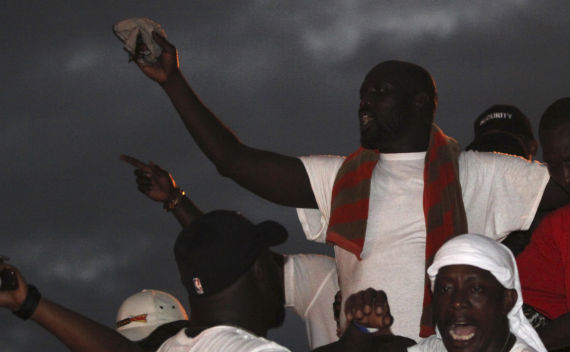Liberia: Devils and Long Spoons
More on:

While international attention is focused on the gruesome death of Qaddafi and Kenya’s incursion into Somalia to fight al-Shabaab, Liberia is heating up.
When the brutal warlord (and now born again) Prince Johnson announced that he would support Ellen Johnson-Sirleaf in the November 8 runoff for the Liberia presidency against Winston Tubman, I observed that she needed a long spoon to sup with the devil. Now, the devil is demanding his due: thirty percent of government positions in return for his support. If she demurs, Prince Johnson hints that he will throw his support to the rival Winston Tubman ticket.
However, that is unlikely considering Prince Johnson’s concern that a Tubman government would implement the shelved 2009 Truth and Reconciliation Commission (TRC) report, which said he should be prosecuted for his role in the civil war, and that Johnson-Sirleaf should be banned from politics. At the end of the day, shared concern about the TRC may facilitate a bargain between Prince Johnson and Johnson-Sirleaf.
Enter another devil and the need for a second long spoon. To reach out to supporters of warlord and former chief of state Charles Taylor, Tubman publicly says that if Taylor is acquitted by the International Criminal Court in the Hague, he would be free to return to Liberia and re-enter politics. He has also said that Taylor’s wife, Senator Jewel Taylor, would have a place in his presidential administration. Predictably, Congressmen Ed Royce (R.-Calif.) and Jesse Jackson, Jr. (D-Ill.) have strongly objected to Taylor’s return to Liberia under any circumstances. Royce said that if Taylor were to return, U.S. aid to Liberia, about sixteen percent of the country’s budget, would be “turned off.”
The unpleasant reality is that Prince Johnson and Charles Taylor retain substantial support in Liberia and Johnson-Sirleaf and Tubman need their supporters (or many of them) if they are to win the runoff.
To complicate matters, there are now contradictory reports that Tubman’s health is failing and that for the runoff he may be replaced by his vice presidential running mate, former soccer star and youth idol George Weah. The charismatic Weah might be a stronger runoff candidate against Johnson-Sirleaf than the seventy-year old Tubman, whatever the state of the latter’s health. But it is not clear whether candidates can be replaced or substituted for a runoff.
And, while the Carter Center has given the first round of elections a clean bill of health, charges of fraud may be setting the stage for a repudiation of the elections by an aggrieved party.
Liberia is a profoundly fractured country where much of the surviving political class is tainted by the civil wars. The Liberian press reports that when they learned that there would be a runoff, Tubman and Weah danced “a grand boogie.” Liberia’s friends must hope that the country doesn’t dance over the brink.
More on:
 Online Store
Online Store